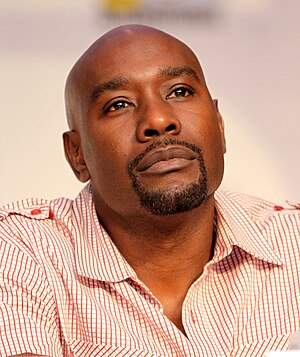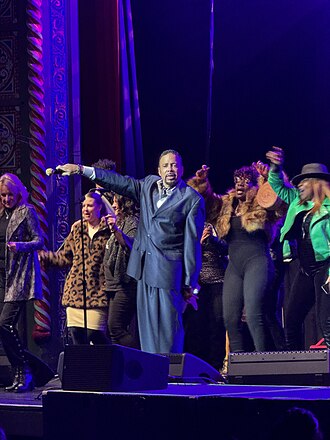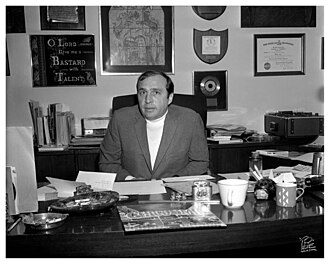Discover Your Roots
SIGN UPDiscover Your Roots
SIGN UPMorris is a male name of Latin origin, meaning "Dark Skinned." It is a given name in English and other languages, and notable persons with this name include a diverse range of individuals from different fields. Some famous individuals with the name Morris include Brazilian singer and songwriter Morris Albert, American film and television actor Morris Chestnut, Taiwanese businessman Morris Chang, and American philosopher Morris Raphael Cohen, among many others. Additionally, the name Morris is also associated with fictional characters such as Morris Bench, also known as Hydro-Man, a Marvel Comics supervillain. Overall, the name Morris carries a historical and cultural significance, and its meaning reflects its Latin origins.

Morris Lamont Chestnut, born on January 1, 1969, in Cerritos, California, is a well-known American actor. He gained recognition for his role as Ricky in the 1991 film Boyz n the Hood. Throughout his career, Chestnut has appeared in numerous feature films, including G.I. Jane, The Brothers, Like Mike, Ladder 49, The Game Plan, The Call, and Kick-Ass 2. He has also taken on notable television roles, such as Ryan Nichols in ABC's V, Ike Prentiss in Showtime's Nurse Jackie, and the lead role of Beaumont Darius Rosewood, Jr. in Fox's Rosewood. Chestnut's outstanding performances have earned him six NAACP Image Award nominations, with wins for Nurse Jackie and The Best Man: The Final Chapters. In addition, he has been honored with a star on the Hollywood Walk of Fame. With a background in finance and drama from California State University, Northridge, Chestnut transitioned from being a bank teller to a successful actor. His contributions to both film and television have solidified his status as a respected figure in the entertainment industry.

Morris E. Day, born on December 13, 1957, is a prominent American musician and songwriter, renowned as the lead singer of The Time. He gained fame through his association with Prince, having attended the same high school in Minneapolis and eventually becoming bandmates in the group Grand Central. Day has also made notable appearances in films like "Purple Rain," "Graffiti Bridge," "Moving," and "The Adventures of Ford Fairlane." He has also appeared in television shows such as "New Attitude," "Eve," "Moesha," and "227." In 2022, a legal dispute with the Prince Estate arose, resulting in restrictions on the use of the name "Morris Day and the Time." Furthermore, Day announced his retirement after his 2023–2024 tour and the release of his final solo album, "Last Call." With an illustrious career spanning music and acting, Morris Day's impact on the entertainment industry remains indelible. For more information, you can find him on his official website, AllMusic, and IMDb.

Morris Russell Peterson Jr., born on August 26, 1977, is a former professional basketball player who made a significant impact during his 11 seasons in the National Basketball Association (NBA). Known for his college basketball success with the Michigan State Spartans, Peterson earned Big Ten Player of the Year honors and played a pivotal role in securing the national title in 2000. His talent and leadership were further showcased during his NBA career, particularly with the Toronto Raptors, where he became a fan favorite and excelled as an elite perimeter defender and consistent scorer. Peterson also had stints with the New Orleans Hornets, Oklahoma City Thunder, and the Charlotte Bobcats. After retiring from basketball, he transitioned to a broadcasting career, providing insightful analysis for TSN's coverage of Toronto Raptors games and NCAA March Madness. Additionally, Peterson ventured into the restaurant industry, opening "MoPetes Sports Retreat" near his hometown of Flint. His contributions to basketball and the community have solidified his legacy as a respected figure both on and off the court.

Morris Seligman Dees Jr., born on December 16, 1936, is an esteemed American attorney recognized for co-founding and serving as the former chief trial counsel for the Southern Poverty Law Center (SPLC) in Montgomery, Alabama. Prior to establishing SPLC, Dees operated a successful direct marketing firm and engaged in civil rights legal practice. His groundbreaking strategies have been attributed to significantly impeding hate groups such as the Ku Klux Klan through innovative litigation methods. However, in March 2019, Dees was dismissed from SPLC amid allegations of complicity in harassment and racial discrimination, as well as sexual harassment accusations. Dees' early life in Shorter, Alabama, and his involvement in political campaigns, including serving as the financial director for George McGovern's presidential campaign, have shaped his impactful career. With a strong commitment to civil rights, Dees' legal practice has been characterized by the pursuit of justice and equality, marked by notable cases such as representing Ku Klux Klan member Claude Henley and suing the Young Men's Christian Association in Montgomery, Alabama. Throughout his career, Dees has been instrumental in pioneering civil lawsuit strategies to hold organizations accountable for wrongful acts, emphasizing the attainment of substantial judgments to dismantle their operations.

Morris Levy (1927–1990) was an influential American entrepreneur in the jazz club, music publishing, and independent record industry. He co-founded Roulette Records, and was a founding partner of the Birdland jazz club and the Roulette Room. Levy was a controversial figure, known for his extensive control in the record business and his involvement in organized crime investigations. He owned over 90 companies employing 900 people and had a significant impact on the music industry. Levy's practices were criticized, with allegations of swindling artists out of their royalties by falsely taking writing credit. He was convicted of extortion in 1990 and died shortly after losing his appeal.Born in Harlem, New York City, Levy's early life was marked by hardship, leading him to quit school at 13 and run away to Florida. His career in the music industry began with managing nightclubs and eventually founding Birdland, where he recognized the potential profits from owning music copyrights. Levy's influence extended to the rock and roll music scene, and he famously sued John Lennon over a song dispute, receiving a settlement but ultimately facing a countersuit.In 1984, the FBI targeted Levy in an investigation into organized crime's alleged infiltration into the record business, resulting in his conviction for extortion. This marked the end of his controversial career, as he passed away before serving his sentence. Levy's impact on the music industry, both positive and negative, remains a significant part of his legacy.
All images displayed on this page are sourced from Wikipedia or Wikimedia Commons.We use these images under their respective Creative Commons or public domain licenses. Wherever applicable, author attributions and license information are provided. If you believe an image is used incorrectly or outside its license terms, please contact us so that we can review and correct the issue.